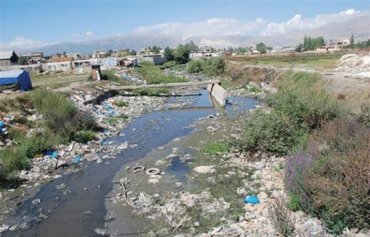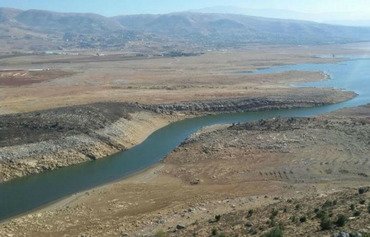Some 2,000 Syrian refugees living in informal camps along the Qasimiyeh river in south Lebanon have been forced to find alternative accommodation since the Litani River Authority began removing their encampments.
The authority made this move after river water pollution reached peak levels due to the discharge of raw sewage from the informal camps into the river.
The removal of Syrian refugee encampments began in mid-February and continues to date along the Qasimiyeh -- the southern portion of the Litani.
Litani River Authority chairman Sami Alawiyeh told Al-Mashareq the authority made this move "after seeing that 26,000 latrines in informal Syrian refugee camps were dumping their wastewater into the river".
![Syrian refugees are being forced to relocate from informal camps along Lebanon's Qasimiyeh river because of high pollution levels in the water. [Photo courtesy of the Litani River Authority]](/cnmi_am/images/2019/04/25/17755-Litani-river-refugees-600_384.jpg)
Syrian refugees are being forced to relocate from informal camps along Lebanon's Qasimiyeh river because of high pollution levels in the water. [Photo courtesy of the Litani River Authority]
![Wastewater drainage from informal refugee camps along the Qasimiyeh river has resulted in a high level of pollution. [Photo courtesy of the Litani River Authority]](/cnmi_am/images/2019/04/25/17756-Litani-tent-flooding-600_384.jpg)
Wastewater drainage from informal refugee camps along the Qasimiyeh river has resulted in a high level of pollution. [Photo courtesy of the Litani River Authority]
The discharge of sewage has raised the river's pollution level, he said, noting that villages and towns along the river also dump their wastewater into it.
Refugees without shelter
The evacuation of informal camps at Qasimiyeh, Sarafand and Saksakiyeh have left a large number of refugees without shelter -- among them Qassem Mohammed Qassem and his family of eight.
"The camp near the Qasimiyeh river in the Zahrani area sheltered my family and young children," he told Al-Mashareq. "We lived in it for years."
"But in mid-March, we became homeless and are currently living with another family in a room in the village," he said.
"We evacuated the camp when the Litani River Authority asked us to do so," Qassem said. "I know we lived adjacent to sewage-polluted water, but we are not to blame for what happened."
"We were forced by the circumstances of our displacement to live in a camp near the river," fellow refugeee Barea al-Khalil Ahmed told Al-Mashareq. "We were aware that we were living in a polluted environment."
"When the authority removed our camp, we stayed for days without shelter until my husband rented a room that we moved into and share with another family," she said.
Helping refugees relocate
"Close to 640 Syrian refugees were evicted on April 4th from informal camps and encampments near the Litani," said UNHCR senior public information assistant Joy Yazbek.
The UNHCR has been in communication with those families and is following up with them to assess their needs, she told Al-Mashareq.
The agency has been "assisting the most vulnerable refugees and those affected by the evictions with the aim of helping them find alternative housing", she said.
Meanwhile, humanitarian workers are "making the necessary arrangements to build sewage systems in the informal camps and connect them to wastewater treatment plants in the areas in which they are located", she added.
"If a certain camp is not up to basic humanitarian standards, we make it a priority to intervene and talk to the landowners and municipalities to address this issue," Yazbek said.
Agencies like the UNHCR "strive always to co-ordinate with the relevant central and local authorities to build basic sanitation facilities to minimize the impact of these camps on Lebanon's environment", she said.
Inundated with raw sewage
"There are 4,200 Syrian refugees living in informal camps on the banks of the Qasimiyeh river," Alawiyeh said. "Since we began removing the encroachments in March, we have evacuated 2,000 refugees, and counting."
According to Alawiyeh, these refugees work in the agricultural sector.
"They rented land from the landowners, pitched their tents on them and channeled their wastewater into the river," he said.
"The authority warned the camp residents they must evacuate the encampments, but they did not do so," he said.
"So we were forced to remove them from alongside the Qasimiyeh river irrigation channel in the Zahrani, Sarafand and other areas in south Lebanon after the river became inundated with raw sewage," he added.
The water pollution harmed both residents and irrigation projects, he said, stressing that the authority "does not blame the refugees for this pollution".
It is up to the state and municipalities to manage the situation, he said.
"The governmental committee submitted a recommendation that called for moving the camps away from the banks of the Litani river," he said, adding that had this been implemented, "we would not have gotten to this point".

![Wastewater from informal refugee camps on the banks of Lebanon's Qasimiyeh river has been causing water pollution. [Photo courtesy of the Litani River Authority]](/cnmi_am/images/2019/04/25/17757-Litani-river-flood-600_384.jpg)






